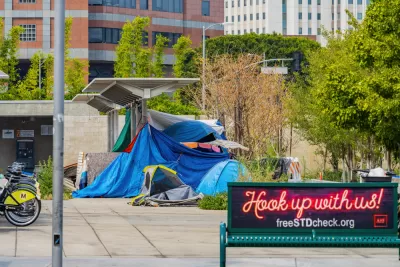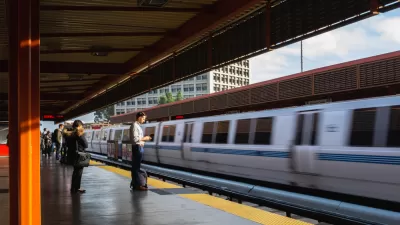An article by the L.A. Times earlier this week has raised the temperature of the debate about drug users and crime on rail transit. Concerns about public safety on transit are a common symptom of post-pandemic transit around the country.

“Since January, 22 people have died on Metro buses and trains, mostly from suspected overdoses — more people than all of 2022. Serious crimes — such as robbery, rape and aggravated assault — soared 24% last year compared with the previous,” according to an article by Rachel Uranga for the Los Angeles Times.
The article has been the talk of social media all week, with advocates and public officials weighing in on either side of the issue. The article suggests that ridership on the Los Angeles County Metropolitan Transportation Authority (Metro) is suffering as a result of the perceived public safety risks on the system—particularly on the system’s rail lines.
Commuters have abandoned large swaths of the Metro train system. Even before the pandemic, ridership in the region was never as high as other big-city rail systems. For January, ridership on the Gold Line was 30% of the pre-pandemic levels, and the Red Line was 56% of them.
Eventually, the article discusses the Ambassador Program, launched by metro at the beginning of March after being announced in June 2022:
In response to such concerns, transit officials committed $122 million over the last year trying to make the system — composed of 105 rail stations and more than 12,000 bus stops — feel safer by placing 300 unarmed “ambassadors” to report crimes and help passengers. It’s part of what officials like to tout as a “multilayered” approach to improving a system that’s become emptier and more dangerous over recent years — even as billions have been sunk into expansion of the rail lines.
The article also provides details about the fentanyl crisis in Los Angeles and the ongoing debate about how best to react. In the meantime, transit is in the midst of a crisis of multiple dimensions—with ridership, funding, policing, operator shortages, and public perception, just to name a few.
FULL STORY: L.A. riders bail on Metro trains amid ‘horror’ of deadly drug overdoses, crime

Manufactured Crisis: Losing the Nation’s Largest Source of Unsubsidized Affordable Housing
Manufactured housing communities have long been an affordable housing option for millions of people living in the U.S., but that affordability is disappearing rapidly. How did we get here?

Americans May Be Stuck — But Why?
Americans are moving a lot less than they once did, and that is a problem. While Yoni Applebaum, in his highly-publicized article Stuck, gets the reasons badly wrong, it's still important to ask: why are we moving so much less than before?

Research Shows More Roads = More Driving
A national study shows, once again, that increasing road supply induces additional vehicle travel, particularly over the long run.

Judge Halts Enforcement of Anti-Homeless Laws in Grants Pass
The Oregon city will be barred from enforcing two ordinances that prosecute unhoused residents until it increases capacity and accessibility at designated camping sites.

Advancing Sustainability in Los Angeles County Schools
The Los Angeles County Office of Education’s Green Schools Symposium brings together educators, students, and experts to advance sustainability in schools through innovative design, climate resilience strategies, and collaborative learning.

Using Old Oil and Gas Wells for Green Energy Storage
Penn State researchers have found that repurposing abandoned oil and gas wells for geothermal-assisted compressed-air energy storage can boost efficiency, reduce environmental risks, and support clean energy and job transitions.
Urban Design for Planners 1: Software Tools
This six-course series explores essential urban design concepts using open source software and equips planners with the tools they need to participate fully in the urban design process.
Planning for Universal Design
Learn the tools for implementing Universal Design in planning regulations.
City of Moreno Valley
Institute for Housing and Urban Development Studies (IHS)
City of Grandview
Harvard GSD Executive Education
NYU Wagner Graduate School of Public Service
City of Cambridge, Maryland
Newport County Development Council: Connect Greater Newport





























